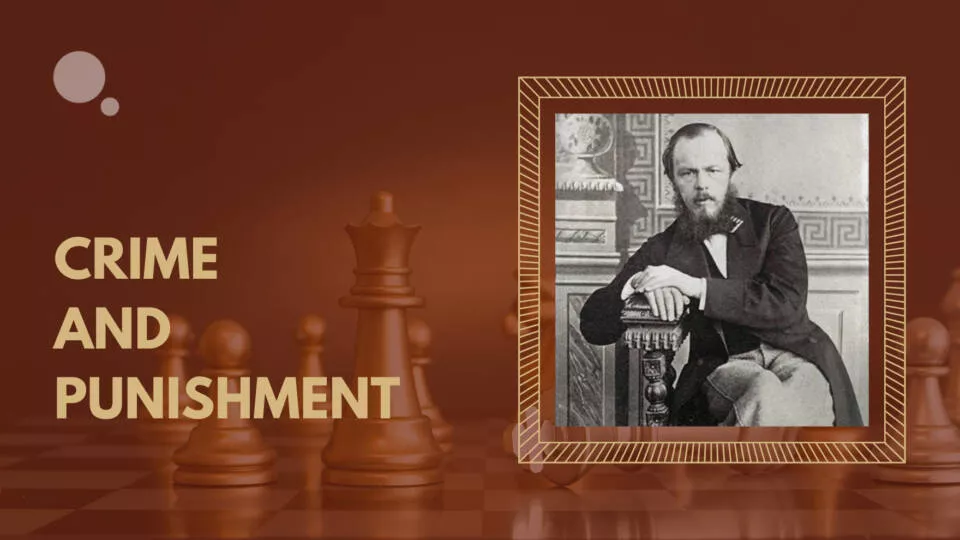Brief Summary
‘Crime and Punishment,’ written by Fyodor Dostoyevsky, is the psychological examination of Rodion Raskolnikov, a destitute ex-student in St. Petersburg. Raskolnikov, believing in his theory about ordinary and extraordinary individuals, murders a pawnbroker, considering her a parasite in society. He also kills her innocent sister, who unexpectedly witnesses the crime, leading to his moral and mental deterioration.
While Raskolnikov navigates his guilt and paranoia, other characters like Sonya Marmeladov, a devout Christian and prostitute, and detective Porfiry Petrovich, who suspects Raskolnikov of the murders, become crucial to his journey. Raskolnikov forms a bond with Sonya due to her purity and suffering.
Despite his attempts to maintain his innocence, Raskolnikov’s guilt continually pushes him towards confession. After revealing his crime to Sonya, he’s moved by her insistence on confession and redemption. Following another tense interaction with Porfiry, he decides to confess.
Sentenced to eight years in a Siberian labour camp, Raskolnikov experiences Sonya’s unwavering support. Her love, coupled with his suffering, leads him to a spiritual awakening. He rejects his previous notions of being an ‘extraordinary man’ and fully accepts the moral weight of his crime, finding redemption in the process.
Ten Best Lines
- “Pain and suffering are always inevitable for a large intelligence and a deep heart.”
- “To go wrong in one’s own way is better than to go right in someone else’s.”
- “It takes something more than intelligence to act intelligently.”
- “But the more I keep myself from it, the more I’m drawn towards it.”
- “Man grows used to everything, the scoundrel!”
- “We sometimes encounter people, even perfect strangers, who begin to interest us at first sight, somehow suddenly, all at once, before a word has been spoken.”
- “Power is only vouchsafed to the man who dares to stoop and pick it up.”
- “If he has a conscience, he will suffer for his mistake. That will be his punishment – as well as the prison.”
- “The darker the night, the brighter the stars, the deeper the grief, the closer is God!”
- “There are things which a man is afraid to tell even to himself, and every decent man has a number of such things stored away in his mind.”
Key Takeaways
- Critique of Radicalism: The book critiques radical ideologies (like Raskolnikov’s belief in his own extraordinary status) that justify immoral actions for what they perceive as higher purposes.
- The Role of Suffering: Dostoyevsky portrays suffering as a necessary path to redemption, as seen in Raskolnikov’s mental anguish after the crime and his eventual confession.
- Moral Responsibility: The story emphasizes that one cannot escape the moral consequences of their actions, even if they manage to avoid legal punishment.
- Alienation and Isolation: Raskolnikov’s mental state and moral dilemma isolate him from society, highlighting the destructive effects of isolation on the human psyche.
- Religious Redemption: The novel suggests that religious faith and love can lead to redemption, as seen in Sonya’s character and her influence on Raskolnikov.
- Social Critique: Through its characters and their struggles, the novel critiques the socioeconomic conditions of 19th-century Russia.
- The Power of Love: The novel demonstrates the transformative power of love through Sonya’s selfless love for Raskolnikov, which ultimately leads him to confess his crime.
- The Psychological Impact of Crime: The novel explores the psychological impact of committing a crime, particularly the effects of guilt and paranoia.
- Free Will and Determinism: The novel delves into the philosophical debate of free will versus determinism, as Raskolnikov tries to assert his free will through his actions but finds himself entrapped in the consequences of his crime.
- The Complexity of Human Nature: Dostoyevsky uses Raskolnikov’s character to explore the complexities of human nature, including morality, guilt, and redemption.
Note:
This summary and key takeaways of Dostoyevsky’s ‘Crime and Punishment” only offer a glimpse into the rich tapestry of his thought-provoking narrative and philosophical insights. To truly appreciate Dostoyevsky’s profound exploration of the human psyche, morality, and societal critique, reading the entire book is highly recommended.
This article was created using a generative AI tool
Stay updated with all the insights.
Navigate news, 1 email day.
Subscribe to Qrius

